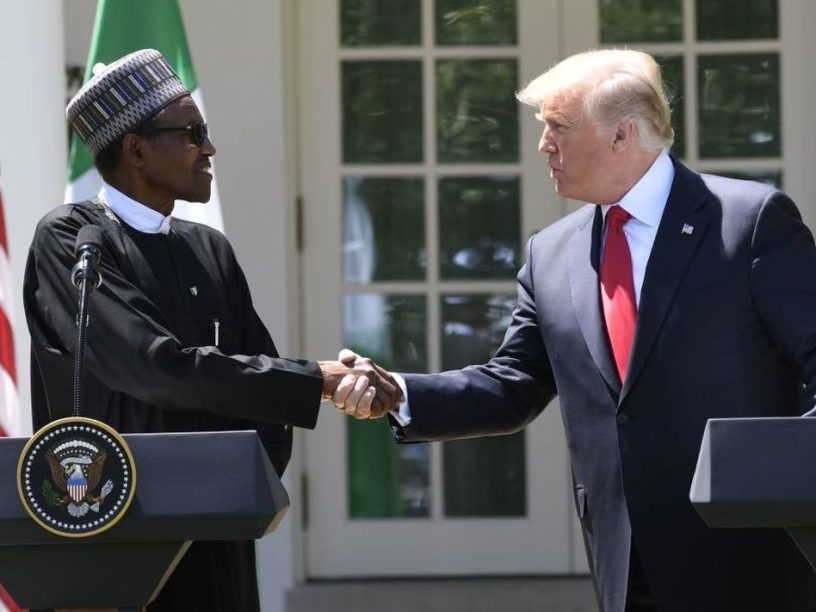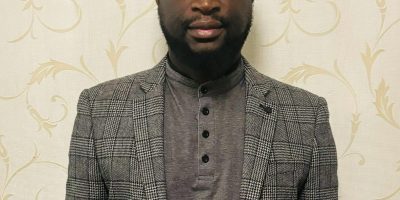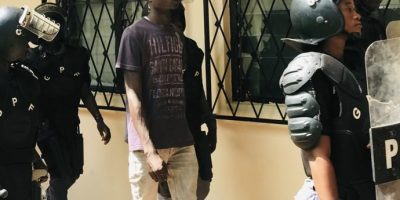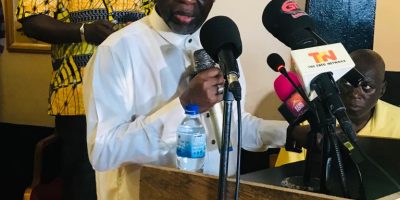Joint media release by the Government of Jersey, the Government of the Federal Republic of Nigeria and United States of America Department of Justice

President Trump and Nigerian President Muhammadu Buhari hold a joint news conference in the Rose Garden of the White House on Monday.
On Monday, 3 February 2020, the Government of Jersey, the Federal Republic of Nigeria and the Government of the United States of America entered into an Asset Recovery Agreement to repatriate over US$308 million of forfeited assets to Nigeria.
The funds were laundered through the US banking system and then held in bank accounts in Jersey in the name of Doraville Properties Corporation, a BVI company, and in the name of the son of the former Head of State of Nigeria, General Sani Abacha. In 2014 a U.S. Federal Court in Washington DC forfeited the money as property involved in the illicit laundering of the proceeds of corruption arising in Nigeria during the period from 1993 to 1998 when General Abacha was Head of State.
This case is a result of extensive co-operation between the Jersey authorities, the Money Laundering and Asset Recovery Section of the United States Department of Justice and the Federal Bureau of Investigation, and the Federal Republic of Nigeria, with crucial assistance from other governments around the world.
At the time the case was filed as part of the U.S. Department of Justice’s Kleptocracy Asset Recovery Initiative in 2013, it was the largest U.S. kleptocracy forfeiture action ever commenced. In 2014 the Attorney General of Jersey applied for, and was granted, a Property Restraint Order over the Jersey bank account balance of Doraville. This was challenged in the Royal Court of Jersey and Court of Appeal, and an application for permission to appeal to the Privy Council by Doraville was refused. France and the United Kingdom restrained additional funds at U.S. request.
General Abacha and his associates stole and laundered many hundreds of millions of dollars of public money during his military regime, doing vast harm to the futures of his own people. The monies were laundered by his family, including his sons Ibrahim and Mohammed, and a number of close associates. The laundering operation extended to the United States and European jurisdictions such as the UK, France, Germany, Switzerland, Lichtenstein and Luxembourg.
In 2018, Governments of the Federal Republic of Nigeria, United States of America and the Bailiwick of Jersey commenced the negotiation of the procedures for the repatriation, transfer, disposition and management of the assets. The tripartite agreement signed this week represents a major watershed in international cooperation in asset recovery and repatriation, and will provide benefit to people throughout Nigeria.
The projects on which the funds will be expended will be administered by the Nigeria Sovereign Investment Authority and independently audited. The Federal Republic of Nigeria will establish a Monitoring Team to oversee the implementation of the projects and to report regularly on progress. The Nigerian government, in consultation with the other Parties, will also engage Civil Society Organisations, who have expertise in substantial infrastructure projects, civil engineering, anti-corruption compliance, anti-human trafficking compliance, and procurement to provide additional monitoring and oversight.
The Solicitor General and Attorney General designate of Jersey, Mark Temple QC, who signed the Agreement on behalf of Jersey, commented:
“This Agreement represents the culmination of two decades of intensive work by Law Officers in Jersey, the United States and Nigeria. The return of the assets to Nigeria had been delayed by a number of hard-fought challenges by third parties which were defeated in the Courts in Jersey and the United States.
“The Agreement establishes a framework based on fruitful co-operation, trust and respect so that the forfeited funds can be repatriated to benefit the people of Nigeria, from whom they had been taken. The use of the funds will be subject to monitoring and reporting obligations.
“This is a very significant achievement, and, once again, demonstrates Jersey’s commitment to tackling international financial crime and money laundering.”
Jersey’s Minister for External Relations, Senator Ian Gorst, said:
“Since becoming aware that the alleged proceeds of Abacha corruption and money laundering had passed through Jersey financial institutions, the Jersey authorities have done everything within their power to investigate what happened and to return the money to its rightful owners, the people of Nigeria.
“I would like to offer my sincere thanks and appreciation to the dedicated team within the Law Officers’ Department, and their colleagues in United States and Nigeria. Their excellent level of cooperation in the fight against corruption, at domestic and international levels, should be an example for other jurisdictions to follow.
“As a leading international finance centre with an effective and robust regulatory regime, Jersey has a responsibility to firmly address any instances of alleged money laundering and corruption. Our commitment to seeing these funds repatriated has led to a positive outcome for the people of Nigeria, has established lasting partnerships and given us a pioneering role in asset-recovery that is based on the principles of national interest, trust and mutual respect.”
Deputy Assistant Attorney Brian Benczkowski announced the agreement on behalf of the United States and stated:
“The Department is pleased to enter into this agreement with The Bailiwick of Jersey and the Federal Republic of Nigeria to return this enormous amount of stolen funds for the benefit of the people harmed by the corruption in Nigeria. Through the recovery of these funds — and this mutual agreement — the people of Nigeria can see the money they lost to corruption in flagrant disregard of the rule of law is returned through a lawful process, and in a manner that ensures transparent and accountable use of the funds. This is a major achievement. It also stands as a clear statement of our commitment to safeguard the United States from those who seek to launder the proceeds of corruption through the abuse of our financial system.”
Mr. Abubakar Malami, SAN, the Attorney General of the Federation and Minister of Justice, Nigeria who signed on behalf of the Nigerian government noted that this agreement has “culminated in a major victory, for Nigeria and other African countries as it recognizes that crime does not pay and that it is important for the international community to seek for ways to support sustainable development through the recovery and repatriation of stolen assets.
He noted further that “without the commitment of the three parties to the Agreement (Nigeria, Jersey and the United States) and that of the legal experts and Attorneys representing Nigeria, it would have been impossible to achieve the success recorded today.
Mr. Malami, also stated that “As you are aware, the government of Nigeria has committed that the assets will support and assist in expediting the construction of the three major infrastructure projects across Nigeria – namely Lagos – Ibadan expressway, Abuja – Kano express way and the second Niger bridge. These projects currently been executed under the supervision of the Nigeria Sovereign Investment Authority (NSIA) as a public private partnership (PPP) will boost economic growth and help alleviate poverty by connecting people and supply chains from the East to the West and to the Northern part of Nigeria, a vast area covering several kilometers with millions of the country’s population set to benefit from the road infrastructures.“
He urged for greater cooperation and mutual respect amongst countries in the implementation of expeditious cooperation measures already set out in the United Nations Convention Against Corruption and in the implementation of the GFAR principles on the repatriation of stolen assets.
He called for civil society organizations and the Nigerian public to be involved in the monitoring of the implementation of the key infrastructure projects that will greatly enhance road transportation in Nigeria.
ENDS
Notes for Editors
1. The Role of Jersey
This is the largest single asset repatriation the Island has undertaken, and among the largest in the world, following almost 20 years of investigations and legal proceedings.
This case forms part of the Jersey investigation into Abacha Money Laundering. Jersey took a leading role in the international investigations that began following General Abacha’s death. It has already returned substantial funds (over US$200 million) to Nigeria.
Jersey issued an arrest warrant for the individual who co-ordinated a large part of the Abacha’s money laundering operation: Abubakar Bagudu, this resulted in his arrest in Texas and a number of jurisdictions with outstanding investigations into him delegating their prosecutions to Nigeria.
Jersey was the only jurisdiction in the world to conduct a trial for money laundering in relation to the misuse of its financial system by the Abacha criminal organisation: Attorney General v. Bhojwani. That case was litigated in Jersey between 2007 and 2010 and Mr Bhojwani’s application to the European Court of Human Rights was ultimately dismissed in 2016.
Jersey will retain US $5 million in respect of its costs and expense in the recovery of assets and the US will retain up to $5 million in respect of its costs and expenses. The exact sum to be returned to Nigeria is dependent on matters such as additional bank interest accruing. However, it will be well over US$300 million net of Jersey’s and the US’s costs and expenses.
A further US $18 million of assets has been paid into the Royal Court of Jersey pending resolution of a claim by a third party. These additional monies may potentially be available for payment to the US and Nigeria under the Agreement in the future.
2. The Role of the United States of America
In November 2013, the Department of Justice’s Money Laundering and Asset Recovery Section (MLARS) and the F.B.I. filed a civil forfeiture action that alleged that approximately $625 million located in Jersey, France, and the United Kingdom was traceable to money laundering in the United States involving the corruption of General Abacha and his associates. This forfeiture action was the result of years of investigation and forensic analysis by the Department of Justice and the F.B.I., with valuable support and evidence from Jersey, Nigeria, the United Kingdom, France, Switzerland and other countries.
In 2014, MLARS successfully obtained a forfeiture judgment against approximately $500 million of these funds, but efforts to enforce that judgment were delayed until 2018 when the federal appellate court in the District of Columbia definitively rejected the appeals of a third party who had unsuccessfully sought to intervene. In addition to the funds already recovered in Jersey, the United States continues to seek assistance from its partners to enforce the remainder of this judgment against the additional $18 million in Jersey, as well as approximately $144 million in France and approximately $30 million in the UK.
The United States also continues to litigate to recover approximately €160 million (USD $177 million) placed into trusts that name Bagudu and his relatives as beneficiaries. The forfeiture complaint alleges that Bagudu, the current Governor of Kebbi State, was an associate of the Abacha family who played a primary role in laundering corruption proceeds. The United States has successfully obtained a second district court judgment forfeiting approximately $31 million of these assets located in the United Kingdom, which is potentially subject to appeal. Bagudu did not file a claim in the U.S. proceedings, although his brother is continuing to oppose forfeiture of the remaining $136 million.
3. The projects that will be funded by the forfeited assets to be returned to Nigeria are:
a. Lagos to Ibadan Expressway
The Lagos–Ibadan Expressway is a 127.6-kilometre-long (79.3 mile) expressway located in the southwest of the country. It connects Ibadan, the capital of Oyo State, to Lagos, Nigeria’s most populous city and commercial capital. It is also the busiest interstate highway in the country and the major route to the northern, southern and eastern parts of Nigeria. This Project is expected to be completed in #insert date#.
b. Abuja to Kano Road
The Abuja-Kano is a major artery that links the Federal Capital Territory (Abuja) to the northern parts of the country. The scope of work involves the rehabilitation, expansion and construction of a 375 kilometre dual carriageway. This project is expected to be completed in #insert date#.
c. Second Niger Bridge
The bridge is being constructed across the River Niger between Delta State in the South geopolitical region to Anambra State in the south east of the country. It is intended to ease traffic congestion and improve road safety. The scope of work includes the construction of 1.6 kilometre-long bridge, 10.3 kilometre Highway, Owerri interchange and a toll station. This Project is expected to be completed in 2022.
4. This landmark text of the Agreement reflects international good practice on asset recovery, which was made a fundamental principle of international law under the UN Convention against Corruption (UNCAC) in 2005. The Agreement demonstrates how the Convention can be implemented in practice, particularly in relation to Article 57 paragraph 5, which provides that “States Parties may also give special consideration to concluding agreements or mutually acceptable arrangements, on a case-by case basis, for the final disposal of confiscated property”
The United Nations Convention against Corruption a multilateral treaty that has set certain international standards for combatting corruption, including a framework for returning stolen assets that have been forfeited. The United Kingdom ratified UNCAC in 2006 and it was extended to Jersey in 2009. The UK’s implementation of UNCAC was subject to review in 2019 and the Jersey section of the UK’s final report recognises the Island’s robust legislative and policy measures to prevent and fight corruption. The United States played a significant role in the negotiation of the Asset Recovery Chapter of UNCAC, which it ratified in 2006. Nigeria became a party to UNCAC in 2004.
Furthermore, the text of the Agreement embodies many of the Global Forum on Asset Recovery (GFAR) Principles for Disposition and Transfer of Confiscated Stolen Assets in Corruption Cases negotiated by the international community in 2017. These include partnership, transparency and accountability, benefit to the people harmed by corruption, involvement of Civil Society Organisations (CSOs) preclusion of benefit to persons involved in the commission of offenses and discouragement of contingency fee arrangements. The Parties commit to maintain cooperation based on trust and respect, to engage CSOs on the design and implementation of a robust and transparent monitoring programme, and to ensure regular reports on the projects and disbursement of the assets are published online.
Source: US Embassy and Consulate in Nigeria




Ma sha Allah great and thanks for sharing